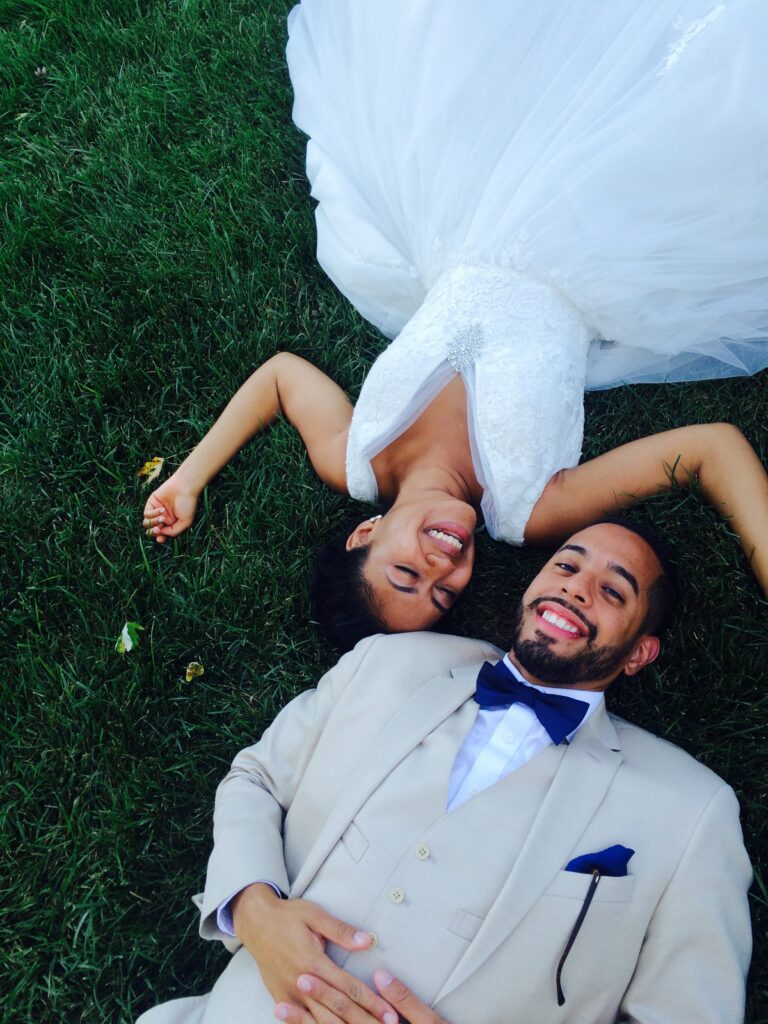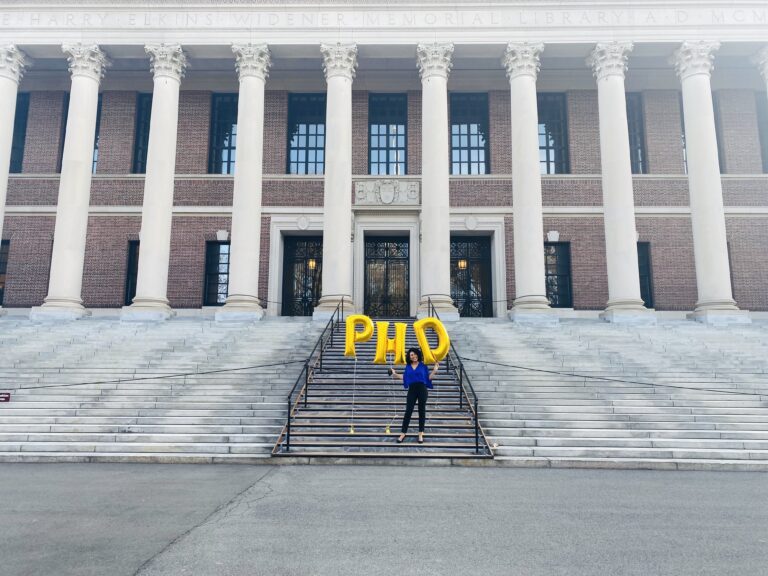Everyone tells you your first year of marriage will be hard, but I never could have foreseen the reason ours has been. When I started reflecting on what’s defined the past year, I originally thought the center of this story was my diagnosis. It’s not. It’s the love that’s sustained me while I’ve been sick that’s left the most indelible mark.
I first felt the lump in my left breast in late July. I was living in a college dorm for the month, running the residential operations of a bridge program for talented incoming freshmen from underrepresented backgrounds. For 5 weeks, I felt almost 17 again. Nights were spent staying up until 2 am talking and laughing, days were spent running around campus, and weekends were dedicated to excursions into nearby Philly. This was my third time running this program, and I knew this year would be my last. Things were changing; I was engaged, I was getting deeper into my PhD program, and try as I might to stay tethered to my life in Philly, I had moved, if not moved on.
I was in the shower one oppressively hot and humid morning, singing along to Chance’s Coloring Book, which had quickly become the soundtrack to my summer. My hand, slippery with lather, glided over my skin as it had a thousand times before, except this time, there was something there that I knew I’d never felt. My breath caught in my throat as my mind raced to the worst possible conclusion, before I remembered the hit I’d taken in a water balloon fight the previous day. Reassuring myself that it was probably just swelling, I rinsed and dried off. I spent a few minutes googling “breast lump” and “breast trauma,” read up on fat necrosis, and went about my day.
Six weeks later, it still hadn’t gone away, so I mentioned it to my partner, Lou. “What if it’s cancer?” I asked. In his characteristically understanding but reasonable way, he reminded me that it was probably nothing, and I’d feel better if I got it checked out and got that confirmed. I fully intended to make an appointment with my doctor – except I actually hadn’t seen a doctor since moving to Cambridge, and therefore had no idea who to see. Between not having a doctor, the craze of last-minute plans for our late September wedding, and the crush of an ambitious fall semester schedule, it wasn’t until late October — and after a few reminders from my new husband — that I made it over to Harvard Health Services for an appointment with the physician whom I’d apparently designated as my primary care physician at the time of my matriculation. She was nice – warm, sympathetic, and optimistic. At my age, and with no family history of breast cancer and no other reason to suspect malignancy, I was assured it was probably nothing, and sent to get an ultrasound. The ultrasound, to my relief, looked completely normal.
But it wasn’t. And I only found that out thanks to the prodding of my physician, who referred me to a surgeon, who in turn sent me for a mammogram. My heart sank as the radiologist motioned me into a small, dark office. He pulled up the images of my left breast and pointed at a cloud of specks that I could’ve sworn were just dust on the screen. Moments later, I was outside in the cold December air, clutching a paper that read “suspicious calcifications. biopsy recommended,” sobbing wildly as I struggled through tears to dial my mother’s number. I walked down Dunster Street, tears streaming, nose running, crying to my mother about the fact that I knew, I just knew, somewhere in the deep recesses of my consciousness, that I had cancer.
I had a paper due that day, so once I got off the phone with my mother and stopped crying in the middle of Harvard Square, I went home and wrote. I finished the semester and had a biopsy a week and a half later. I went home for Christmas — first to my husband’s family’s house in Newark, then to my mother’s in South Jersey, then to my uncle and aunt’s in Maryland. The day after Christmas, three months and a day after our wedding, two days before we were scheduled to leave for our honeymoon, I was told that I had ductal carcinoma in situ, a very early-stage form of breast cancer.
I told Lou immediately, but we waited until we got back to New Jersey to tell my mother and baby sister, because I didn’t want to spoil the holiday celebrations. We stood in the kitchen with tears in our eyes as I bravely smiled and told them I would be okay. Lou and I headed back to Cambridge so I could have more tests run, and then we went on our honeymoon. We spent two weeks in South Africa, where, in a reflection of the current state of my life, heart-stopping beauty and heartbreaking unfairness were simultaneously on display. I alternated between being overwhelmed at joy and wonder at being in a foreign country with my new husband and being wracked with fits of despair at my recent diagnosis. This was supposed to be the happiest, sexiest time of my life, but all I could think about was life without my breasts, and whether I’d ever feel attractive again. Despite the fact that Lou is emphatic about his appreciation for my — ahem — posterior and has given me no reason to doubt that his attraction to me is about much more than my breasts, I found myself crying when he touched them during intimate moments, willing myself to pretend they weren’t there, to detach myself from them mentally so it wouldn’t hurt so much when/if they were physically detached one day soon.
In the weeks that followed, as I was prone to seemingly unprovoked bouts of weepiness, I kept waiting for Lou to show signs of leaving. My father moved out when I was five, and my parents officially split when I was 15. I knew they loved each other, but all I saw was my mother giving and my father taking. The kind of love where someone sees you at your absolute worst and still thinks you’re beautiful and kind and worthy of love and support is something I didn’t think was real, or at least not a real possibility for someone like me. After all, although we say “in sickness and in health” in our wedding vows, most of us probably don’t expect that sickness clause to kick in for a few decades. I couldn’t stop thinking about how unfair this all was to Lou. This wasn’t what he signed up for. He thought he married a healthy, beautiful 27-year-old woman with perfect perky breasts, and just months in, it turned out he’d gotten stuck with a lemon.
But he didn’t seem to see it that way. Over the course of three months, Lou saw me through two more biopsies and a lumpectomy. When I was down, he found ways to make me laugh, often through a running inside joke involving a rock hyrax stuffed animal we brought back from South Africa and named Future Hendrix the Hyrax. When I was too depressed to be bothered with attending to basic activities of daily life, he made sure there was food in our fridge, and he sent gentle reminder texts from work asking if I’d eaten. When I was afraid to look at the incisions after the lumpectomy, he stood by in the next room, ready to come to my side if I was scared by what I saw when I removed the dressings. And when I couldn’t lift my arms to wash my hair, he gently shampooed my tresses in our kitchen sink, and offered to take on the laborious task of detangling my curls. It had been well over a decade since the last time someone other than a paid professional washed my hair, and that deceptively simple act of doing something for me that I was physically incapable of doing for myself brought me to tears. I stood in the middle of our galley kitchen, shoulders heaving, mumbling incoherently about how it was so bizarre how happy I felt in that moment. It turns out I have two things I never expected to have – cancer, and a truly joy-filled, loving, supportive marriage.
After the lumpectomy indicated more surgery would be necessary, I spent almost a month vacillating between two unappealing options – a mastectomy with reconstruction, or a re-excision followed by radiation. My mother and sister asked in our group chat how they could help; my mother asked if she could donate fat to reconstruct my breasts if I didn’t have enough, and my sister offered to be my surrogate if my treatment affected my ability to bear a child. I couldn’t believe the ways in which they quite literally were willing to put their bodies and lives on the line for me. And as I rambled about recurrence rates and aesthetics and sensitivity and fertility for weeks on end, Lou listened quietly. It wasn’t until after I saw a plastic surgeon and decided to have a mastectomy that he finally voiced an opinion. “It’s your body, so I didn’t want to say anything, but I’m glad you’re going that route. I just want the best chance at the most time with you.”
Most women diagnosed with breast cancer are past their childbearing years, which doesn’t make the disease any less awful, but it does make some considerations different. Losing a part of one’s body is never easy, but considering a mastectomy when you haven’t yet had a chance to breastfeed the kids you’d hoped you would one day have with the husband you’re just starting your life with is a pain particular to the plight of the young breast cancer patient. Decisions I’ve had to make about how aggressive to be with surgery are refracted through the lens of what kind of woman, wife, and mother I have imagined myself to be. Every step of the way, Lou has calmed my fears about failing our future children with my inability to breastfeed, or failing him by not being the woman he thought he was marrying. He’s made it clear the only thing that matters is that we’re together, and after seven years together, I finally believe that with every fiber of my being. I had always hoped this is who we were, who we could be together, but now I know beyond any shadow of a doubt that what we have is true and real and deep and strong.
Facing cancer this year has forced me to find beauty in the parts of myself and of my life that this illness cannot take from me. I’ve never been so thankful for the curves of my derrière, my bright but slightly world-weary smile, or the spark in my eye that sometimes dims, but never goes out. But more than I have for any part of myself, I’ve developed an appreciation for the love that surrounds me and envelops us. I’m thankful for friends and family who came out in force to celebrate our wedding and showed up with just as much love and thoughtfulness as we’ve navigated my breast cancer. I’m thankful for my mother and sister, who have handled this unexpected and trying journey with grace, wit, empathy, and prayerfulness. And above all, I am thankful for Lou, who has seen and dealt with the worst of this, but has never stopped believing that our best days are still to come. ✨

